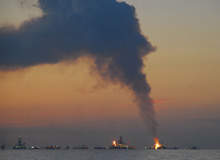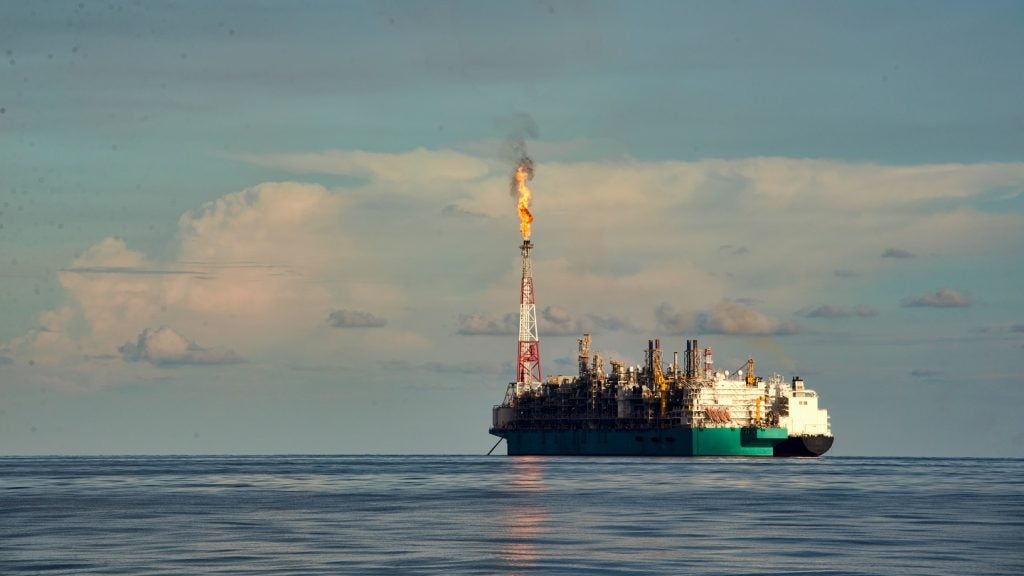
Look through the history books and you will find a litany of events that significantly or radically change the future course of mankind. In terms of offshore drilling and the hydrocarbon industry, the explosion on BP‘s leased Deepwater Horizon oil rig on 20 April 2010, its subsequent sinking and deepwater oil spill is likely to be one of those events.
On 5 July 2010, BP revealed that the cost of its response to the Deepwater Horizon spill was more than $3bn. The oil giant’s share price plummeted some 25% off its 52-week high before starting a comeback as a result.
To make matters worse, the US Government is now pressing the company hard to make sure that all social and industry obligations are met.
There is little doubt that BP’s reputation was dealt a most likely ‘never to be forgotten’ blow.
Already Deepwater Horizon has been dubbed “the worst US environmental disaster ever”, an entry that no company would want on its CV.
See Also:
Deepwater’s cost
How well do you really know your competitors?
Access the most comprehensive Company Profiles on the market, powered by GlobalData. Save hours of research. Gain competitive edge.

Thank you!
Your download email will arrive shortly
Not ready to buy yet? Download a free sample
We are confident about the unique quality of our Company Profiles. However, we want you to make the most beneficial decision for your business, so we offer a free sample that you can download by submitting the below form
By GlobalDataJust how big the eventual bill for the Deepwater Horizon disaster will be is unknown; however, figures up to $70bn have been suggested. Eric Janszen, economics and finance analyst and author of the forthcoming book The Post Catastrophe Economy: Rebuilding America and Avoiding the Next Bubble, says he is sceptical.
“It’s a miracle that there aren’t more accidents given the complexity of deepsea oil production and the varied and dangerous conditions,” Janszen says.
“If we allow energy prices to rise in the US as in other countries we will reduce consumption and the environmental impact. So far the political will to do that has not been there. Maybe the BP disaster will help create it.”
There is a conundrum here: the damage and outrage over the loss of life and the environmental and economic chaos resulting from Deepwater Horizon will be long lasting and long remembered. Nevertheless, while alternative energy sources remain a minority in the US energy portfolio, oil is the very lifeblood of the nation.
Much of the growth in future oil production will have to come from deepwater wells. The easy oil is all but gone and technology has had to step up to the plate to access the hard-to-get black stuff.
Worried, and probably not without good reason, that where one deepwater well failed others may follow, the US administration attempted to impose a deepwater drilling moratorium in the Gulf of Mexico and was successful until a federal judge overturned the ruling in late June 2010, an appeal heard on 8 July 2010 was also upheld. The administration appears, however, determined to have its way and the legal process continues.
“President Obama strongly believes that continuing to drill at these depths without knowing what happened does not make any sense and would jeopardise the safety of those on the rigs and safety of the environment in the gulf,” said White House press secretary Robin Gibbs.
Mulling a drilling moratorium
While a deepwater drilling moratorium makes sense in terms of calling a ‘time out’, until it is known what went wrong with Deepwater Horizon it is equally clear that deepwater drilling must continue if the global demand for oil is to be met.
For exploration and production to continue changes in regulations are a certainty and these changes may well spread globally as no nation’s government will want a repeat of Deepwater Horizon on its watch.
On 23 June 2010, the US Department of the Interior (DoI) announced that Michael R Bromwich, former Department of Justice Inspector General, now director of the newly established Bureau of Ocean Energy Management, Regulation and Enforcement (BOE), is reviewing and investigating offshore oil and gas management and enforcement under the auspices of a new unit; the BOE, formed by a Secretarial order, replaces the former Minerals Management Service.
“The new unit will provide us with the capacity to investigate allegations of misconduct, to provide unified and coordinated monitoring of compliance with laws and regulations and to respond swiftly to emerging and urgent issues on a Bureau-wide level and in the industry,” Bromwich said.
The unit has three core focuses: to investigate allegations of misconduct, to respond to high-priority issues such as spills, accidents and significant incidents, and to implement the reorganisation that will result from the investigation process.
Long-lasting regulations
For the process to work, new regulations cannot simply be a knee-jerk reaction that will have to be changed somewhere on the road ahead. Nonetheless, an idea about the type of regulation change – although it will be probably tougher for deepwater – can be gleaned from recent announcements concerning the allowed continuation of shallow-water drilling, which was announced by the DoI on 8 June 2010, in the form of a safety notice to lessees (NTL). The main points of the NTL include:
- certification from CEOs that its operations are in compliance with regulations
- certification from a professional engineer before drilling operations using a subsea or surface blowout preventer (BOP) stack and for all well casings and cement designs
- independent, pre-drilling, third-party verification that the BOP will operate properly and that the rig equipment is compatible for the job and that blind-shear equipment is adequate
- adherence to new inspection and reporting requirements to obtain independent verification prior to spudding a well that everything is working as designed and that post delivery modifications have not compromised the operation of the BOP
- to have secondary control for subsea BOPs with remote operated vehicle (ROV) intervention capabilities.
- to conduct ROV tests on subsea BOPs
- provide documentation that BOPs have been maintained to regulations.
There could be more regulations applied to deepwater drilling, such as the requirement to drill relief wells and having proven blowout capability on site and / or on proven call at short notice. At the very least the cumulative effect of the likely new US and possibly global deepwater regulations that may follow, coupled with exorbitant insurance rates, will mean that smaller companies simply will not have pockets deep enough to drill deepwater wells anymore – and regulatory scrutiny will become more intense.




